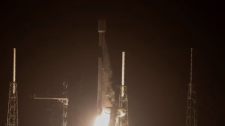The Economist - Small things can have big effects. Take the plant plankton that populate the Earth’s oceans. When zooplankton eat them, the phytoplankton release a chemical called dimethyl sulphide (DMS) and it is this that people are referring to when they speak of the “smell of the sea". Chemical reactions in the atmosphere turn DMS into sulphur-containing particles that offer a surface for water vapour to condense on. Do that enough times and the result is a cloud. Clouds, in turn, affect both the local weather and, by reflecting sunlight into space, the world’s climate.
Mission


